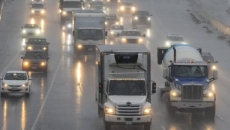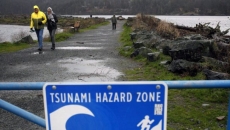The start to wildfire season has been far less dramatic than it was last year but the risk of hot, dry weather and severe fires remains high, officials warned Thursday.
The Canadian Interagency Forest Fire Centre reported around 90 fires burning as of noon on Thursday, including 12 classified as being out of control.
"At the same time last year the situation was quite different," said Jean-François Duperré, the director of emergency planning for the government operations centre at Public Safety Canada.
On May 9, 2023, there were more than 200 fires burning and almost 50 of them were out of control. Most of those were in Alberta, which saw unusually warm weather in late April and early May of last year, with almost no rain.
By that date Alberta was already asking for help to fight fires, and 25,000 people had been forced to flee their homes. Almost 6,000 square kilometres had already burned.
That extreme start led to the worst fire season Canada has seen by far, with 6,600 fires burning more than 150,000 square kilometres of forest, an area greater than all of New Brunswick, Nova Scotia and Prince Edward Island combined.
Julienne Morissette, the director of wildland fire research for Natural Resources Canada, said Alberta's spring has been a bit cooler, with more precipitation than last year.
"While it looks more positive we are still under the effects of significant drought so as temperatures warm things can dry very quickly," she said.
Natural Resources Canada said about one-third of the fires burning now are so-called zombie fires that started last year, went underground for the winter and re-emerged after the snow melted.
Just over 176 square kilometres have burned so far, said Morissette, well below the 25-year average of 510 square kilometres.
Of the current fires, 40 are burning in Alberta, 24 in British Columbia and 10 in Manitoba. Four fires burning in New Brunswick are the only ones in Atlantic Canada, while Ontario has two and Quebec one.
The fire forecast for the rest of May and June shows an elevated risk across all of Western Canada except for the west coast of British Columbia. There is very high to extreme risk in much of southern and central Saskatchewan, parts of northern Alberta and the interior of British Columbia.
Most of Ontario and western Quebec are at moderate risk, while eastern Quebec and Atlantic Canada show low risk.






